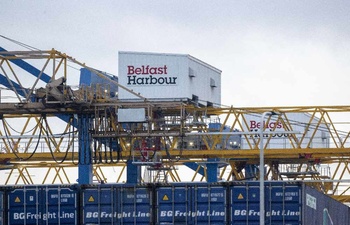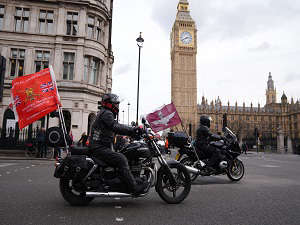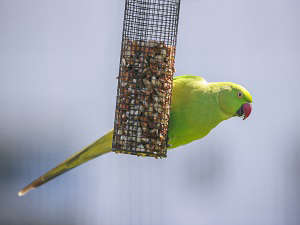
By David Young, PA
Permanent facilities for post-Brexit checks at Northern Ireland ports will not be operating before 2023, MLAs have been told.
The senior official in the Stormont department responsible for the construction said the delay was due to ongoing uncertainty over the volume of regulatory inspections that will be required when grace periods limiting the red tape end.
Department of Agriculture Permanent Secretary Denis McMahon updated his Assembly scrutiny committee on the project timeline on Thursday.
He also confirmed that the final decision to approve the building work was a matter for the wider Stormont Executive, not solely his minister.
Required checks on agri-food goods have been taking place in temporary facilities and repurposed port buildings since the Brexit transition period ended on December 31.
Dr McMahon’s comments came during a committee hearing on the controversial decision to halt checks at those temporary checking points in February due to alleged threats to staff.
Assistant Chief Constable Bobby Singleton told committee members on Thursday that it remained the Police Service of Northern Ireland’s position that there were no credible threats to staff.
The EU has been pressing for urgent progress on building permanent checking facilities, which the bloc had expected to be completed by this summer.
The point of entry inspection points at Belfast, Larne, Warrenpoint and Foyle ports are required under the terms of Brexit’s Northern Ireland Protocol, which requires a series of new checks on certain goods coming into the region from the rest of the UK.
The hold-up in building the facilities is one of the issues of contention between the UK and EU amid the ongoing political dispute over the full implementation of the Protocol.
The European Commission is taking legal action against the UK after London unilaterally moved to delay full implementation by extending a number of the grace periods.
In February, then DUP Stormont agriculture minister Gordon Lyons halted work on the permanent facilities, although physical construction had not yet started.
Mr Lyons, who was temporarily standing in for minister Edwin Poots, also stopped recruitment of additional veterinary staff required to carry out the inspections.
Mr Poots has maintained that position since resuming his ministerial responsibilities after a period of ill health.
Ministers from other Executive parties have questioned whether Mr Lyons or Mr Poots could act unilaterally on the issue, arguing that all controversial decisions must be taken collectively by the five-party administration.
Dr McMahon told the committee that the Executive would need to sign off on the final construction plans.
But he said it was not possible to develop business cases to present to the Executive amid the ongoing uncertainty about how big they will need to be and how many checks they will ultimately have to process when the grace periods end.
He said there was the potential for the volume of checks to increase four fold to around 10,000 a week.
Dr McMahon said the initial timescale for delivery had been “ridiculous”.

He added: “It’s now clear we’re going to need to seek executive approval from the Northern Ireland Executive before any build of permanent facilities could commence.
“Prior to this and over the coming months, we’ll need to prepare a full business case before seeking approval from the Department of Finance and HM Treasury.
“But in order to prepare a robust business case we’ll need clarity on the demand for services, the impact of staffing and the appropriate scale and design of any permanent infrastructure to support the delivery of those services.
“There are, however, some very significant unknowns that still need to be resolved, and the primary concern relates to the potentially huge increase in volume if we reach the end of the current implementation period and do not have the necessary mitigations in place.”
Dr McMahon said there was a “huge variation” in estimated figures on the likely number of checks that will be required.
He said that made it “difficult, if not impossible” to complete a full business case that was in line with Treasury and Stormont guidance on public spending.
“Given this uncertainty and the scale of the works, we’re not expected to be in a position to put final options to the Northern Ireland Executive ahead of October 1 2021,” he said.
“While we’ve already completed the procurement, our current estimate is that the construction will take more than a year, and we do not expect therefore for permanent facilities to be in place, subject to executive approval, before 2023.”
Dr McMahon said Mr Poots had tabled a paper on the issues around the permanent facilities to the Executive, but it had yet to be placed on the agenda for consideration at a meeting.
Also giving evidence to the committee, Northern Ireland’s chief vet Dr Robert Huey said that during the grace periods it had not been possible to carry out even half of the checks required.
He said only around a quarter of the required inspections could be managed, with the highest rate achieved to date being only 38%.
The committee is holding an inquiry into the events that led to the withdrawal of staff from port checks in February after reported threats and the emergence of sinister graffiti near Larne port.
At the time police blamed the graffiti and menacing online comments on disgruntled individuals and small groups.
Officers characterised the incidents as “low level” and insisted there was no evidence of wider paramilitary involvement in threats.
Mr Singleton told committee members on Thursday that the PSNI regularly reviewed the threat assessment and its position had not changed.
“The safety of staff working at these points of entry and control points remains of the utmost importance to PSNI,” the officer told MLAs.
“There is, as of today, no change to our assessment and that assessment is that there was nothing to substantiate or corroborate any paramilitary involvement in threats or intimidation of staff at points of entry or border control posts.”


 Legal papers lodged in challenge to Irish language signs at Belfast station
Legal papers lodged in challenge to Irish language signs at Belfast station
 Bikers to descend on Westminster for veterans protest against Legacy Act repeal
Bikers to descend on Westminster for veterans protest against Legacy Act repeal
 Guidance sought over future of colourful parakeets in Belfast park
Guidance sought over future of colourful parakeets in Belfast park
 Woman released after questioning over pipe bombs in Co Down
Woman released after questioning over pipe bombs in Co Down
 Suspended chief constable will not be prosecuted over alleged sexual offences
Suspended chief constable will not be prosecuted over alleged sexual offences